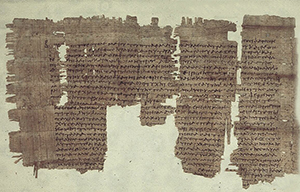Γάμος και Μητρότητα
στην ελληνορρωμαϊκή Αίγυπτο
Κλεανθή Τίρλα
Υποψήφια Διδάκτωρ Αρχαίας Ελληνικής Φιλολογίας με ειδίκευση στην Παπυρολογία
Τμήμα Ελληνικής Φιλολογίας, Σχολή Κλασικών και Ανθρωπιστικών Σπουδών, Δημοκρίτειο Πανεπιστήμιο Θράκης
Υπότροφος Ι.Κ.Υ.
 Κάθε ερευνητής που επιθυμεί να εξετάσει την κοινωνία της ελληνορρωμαϊκής Αιγύπτου βρίσκεται αντιμέτωπος με μία πρόκληση, τον πολυπολιτισμικό της χαρακτήρα, ο οποίος βασίζεται στη συνύπαρξη της αιγυπτιακής, της ελληνικής και της ρωμαϊκής κουλτούρας. Η Αίγυπτος, από την άλλη, προσφέρει πλήθος πρωτογενών πηγών απαράμιλλης αξίας, που έχουν διασωθεί λόγω των κλιματολογικών της συνθηκών. Παπυρικά έγγραφα, τα οποία ανακαλύφθηκαν σε εγκαταλελειμμένες πόλεις, αρχαίες χωματερές και σαρκοφάγους, έρχονται να ρίξουν φως στην ιδιωτική ζωή ατόμων, για τα οποία άλλες πηγές σιωπούν ή είναι λακωνικές. Μία τέτοια ομάδα ατόμων είναι οι γυναίκες της ελληνορρωμαϊκής Αιγύπτου.
Κάθε ερευνητής που επιθυμεί να εξετάσει την κοινωνία της ελληνορρωμαϊκής Αιγύπτου βρίσκεται αντιμέτωπος με μία πρόκληση, τον πολυπολιτισμικό της χαρακτήρα, ο οποίος βασίζεται στη συνύπαρξη της αιγυπτιακής, της ελληνικής και της ρωμαϊκής κουλτούρας. Η Αίγυπτος, από την άλλη, προσφέρει πλήθος πρωτογενών πηγών απαράμιλλης αξίας, που έχουν διασωθεί λόγω των κλιματολογικών της συνθηκών. Παπυρικά έγγραφα, τα οποία ανακαλύφθηκαν σε εγκαταλελειμμένες πόλεις, αρχαίες χωματερές και σαρκοφάγους, έρχονται να ρίξουν φως στην ιδιωτική ζωή ατόμων, για τα οποία άλλες πηγές σιωπούν ή είναι λακωνικές. Μία τέτοια ομάδα ατόμων είναι οι γυναίκες της ελληνορρωμαϊκής Αιγύπτου.
Λέξεις ευρετηρίου: Ιδιωτικές επιστολές, γαμήλια συμβόλαια, προσκλητήρια γάμου, υπομνήματα, materna potestas
COPYRIGHT: © Θέματα Αρχαιολογίας, 2017 - ISSN 2653-9292
Επικοινωνία με την συγγραφέα: kleatir@yahoo.gr
Το πρωτότυπο άρθρο βρίσκεται στη βιβλιοθήκη του περιοδικού Θέματα Αρχαιολογίας
![]()
Αυτό το άρθρο χορηγείται με άδεια Creative Commons Αναφορά Δημιουργού-Μη Εμπορική Χρήση-Όχι Παράγωγα Έργα 4.0 Διεθνές .
Marriage and Motherhood
in Greco-Roman Egypt
Kleanthi Tirla
Ph.D. Candidate, Ancient Greek Literature - Papyrology
Department of Greek Philology, Democritus University of Thrace, Greece
Recipient of the IKY (Greek State Scholarships Foundation) research grant
 The aim of the present paper is to present the results of a study on papyrus documents dating from the Roman period (1st c. BC- 4th c. AD), which deal with family matters, primarily the role of women in Greco-Roman Egypt. Thus, the woman’s position within a marriage is defined in the marriage contracts, which include the terms of a happy marriage. The violation of these terms and the unfair treatment of women by their husbands lead them to send petitions to the authorities, so as to safeguard their rights. Moreover, the letters sent by women to their husbands, who were absent due to professional engagements, reveal their daily life and their feelings. Motherhood is another aspect in women’s lives. According to papyrus documents the mother had an active role in the children’s upbringing, and as a widow, she could carry out transactions reserved for men. The mother in Greco-Roman Egypt enjoyed the respect and affection of her children.
The aim of the present paper is to present the results of a study on papyrus documents dating from the Roman period (1st c. BC- 4th c. AD), which deal with family matters, primarily the role of women in Greco-Roman Egypt. Thus, the woman’s position within a marriage is defined in the marriage contracts, which include the terms of a happy marriage. The violation of these terms and the unfair treatment of women by their husbands lead them to send petitions to the authorities, so as to safeguard their rights. Moreover, the letters sent by women to their husbands, who were absent due to professional engagements, reveal their daily life and their feelings. Motherhood is another aspect in women’s lives. According to papyrus documents the mother had an active role in the children’s upbringing, and as a widow, she could carry out transactions reserved for men. The mother in Greco-Roman Egypt enjoyed the respect and affection of her children.
Key words: private letters, marriage contracts, wedding invitations, petitions, materna potestas
COPYRIGHT: © Themes in Archaeology, 2017 - ISSN 2653-9292
Author for correspondence: kleatir@yahoo.gr
The original article is in the Library of the Themes in Archeology
![]()
Creative Commons Attribution-NonCommercial-NoDerivatives 4.0 International .
Το πρωτότυπο άρθρο βρίσκεται στη βιβλιοθήκη του περιοδικού Θέματα Αρχαιολογίας
![]()
Αυτό το άρθρο χορηγείται με άδεια Creative Commons Αναφορά Δημιουργού-Μη Εμπορική Χρήση-Όχι Παράγωγα Έργα 4.0 Διεθνές .
